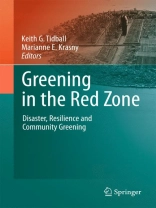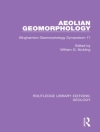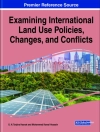Creation and access to green spaces promotes individual human health, especially in therapeutic contexts among those suffering traumatic events. But what of the role of access to green space and the act of creating and caring for such places in promoting social health and well-being? Greening in the Red Zone asserts that creation and access to green spaces confers resilience and recovery in systems disrupted by violent conflict or disaster. This edited volume provides evidence for this assertion through cases and examples. The contributors to this volume use a variety of research and policy frameworks to explore how creation and access to green spaces in extreme situations might contribute to resistance, recovery, and resilience of social-ecological systems.
Mục lục
Foreword.- Preface.- PART I: Foundations.- Introduction: Greening in the Red Zone.- Resilience and Transformation in the Red Zone.- GRZ Vignette 1 – An Urban Park in Earthquake Stricken Port-au-Prince, Haiti.- PART II: Motives and Explanation.- Urgent Biophilia.- Sowing Seeds of Resilience: Community Gardening in a Post-Disaster Context.- GRZ Vignette 2 – Transforming Degraded Space into a Community Asset – The Soweto Mountain of Hope.- The Role of Nature in Children’s Resilience: Cognitive and Social Processes.- Children’s Engagement with the Natural World as a Ground for Healing.- GRZ Vignette 3 – 8, 000 Trees – A Refuge From Ruins in Afghanistan.- Topophilia, Biophilia and Greening in the Red Zone.- Urban Gardens: Pockets of Social-Ecological Memory.- GRZ Vignette 4 – Reconstructing Village Groves After a Typhoon in Korea.- Nature Engagement to Foster Resilience in Military Communities.- Garden for Victory! The American Victory Garden Campaign of World War II.- GRZ Vignette 5 – The Korean DMZ: From Red Zone to Green Zone.- Green Zones from Above and Below: A Retrospective and Cautionary Tale.- Reflections on Defiant Gardens: Making Gardens in Wartime.- PART III: Cases & Practices.- Restoration of the Urban Forests of Tokyo and Hiroshima Following World War II.- Valuing Urban Forest: Lessons to Learn from Hurricanes.- Trees, Rebirth and Resilience: Symbol, Ritual and Resilience in Post-Katrina New Orleans.- GRZ Vignette 6 – The Risks of Greening in the Red Zone: Creating Afghanistan’s First National Park in the Midst of Conflict.- Destruction and Replanting of the Urban Forest of Sarajevo, Bosnia and Herzegovina.- The Re-greening of the Grey: Some Practical Considerations for the Urban Forest.- GRZ Vignette 7 – Trees and Tree Planting in Southern Madagascar: Sacredness and Remembrance.- Community-Based Memorials to September 11, 2001: Environmental Stewardship as Memory Work.- GRZ Vignette 8 – Six Ares of Land for the Resilience of Urban Families in Post-Soviet Russia.- Beyond the Bars: Landscapes for Health and Healing in Corrections.- GRZ Vignette 9 – Wildlife: The Catalyst for Peace in Northern Kenya.- Sustainability-Oriented Social Learning in Multi-Cultural Urban Areas: The Case of the Rotterdam Environmental Centre.- Developing a Safe, Nurturing and Therapeutic Environment for the Families of the Garbage Pickers in Guatemala and for Disabled Children in Bosnia and Herzegovina.- GRZ Vignette 10 – Reforestation Activities at a Chadian Refugee Camp in Northern Cameroon.- Growing Hope: How Urban Gardens are Empowering War-Affected Liberians and Harvesting a New Generation of City Farmers.- Cyprus – Greening the Dead Zone.- GRZ Vignette 11 – The Berlin Wall Trail – A Cycling and Hiking Route on the Traces of Berlin’s Cold War Divide.- Synthesis and Conclusions: Applying Greening in Red Zones.- Name and Subject Index.












